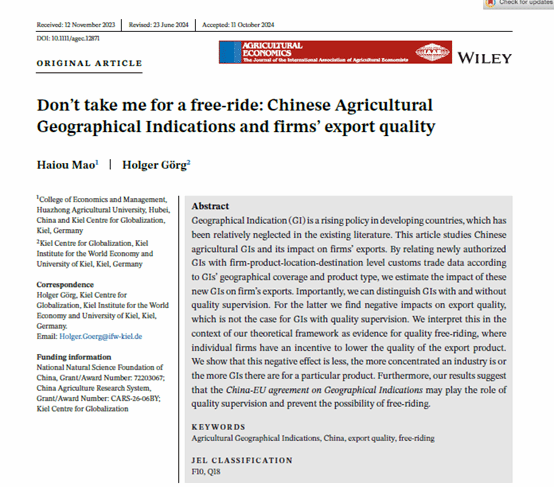近日,我院毛海欧副教授与德国基尔世界经济研究所Holger Görg教授在国际农经学会会刊Agricultural Economics发表题为“Don’t take me for a free-ride: Chinese Agricultural Geographical Indications and firms’ export quality”的论文。

地理标志可以有效缓解农产品质量的信息不对称问题,然而公共产品普遍存在的“搭便车”问题会降低农产品质量和集体声誉。地理标志农产品的“搭便车”现象在中国广泛存在。然而,针对此问题的理论和实证研究还比较少,中国情境下的研究更加稀缺。该研究系统搜集整理了农业农村部和国家质检总局的地理标志产品数据,将其与企业-产品-目的地-时间四维的贸易数据库匹配,检验了地理标志农产品获批对企业出口产品质量的因果效应,深入探讨了产品质量标准对“搭便车”行为的规制作用。
研究发现,地理标志获批后企业的农产品出口质量下降,说明“搭便车”问题的存在,这一问题仅存在于缺乏质量标准的地理标志体系,证实了制定和执行高质量标准是规制“搭便车”行为的有效制度设计。另外,产品市场集中度越高、竞争性地理标志越多,“搭便车”问题越轻。同时,中欧地理标志协定谈判起到了质量监督的作用,有效抑制了“搭便车”行为。
该研究的学术贡献在于:第一,率先从实证角度验证了地理标志产品中的“搭便车”问题,证实了质量标准的关键作用。第二,从中国视角丰富了地理标志研究,弥补了现有研究大多关注欧美国家的不足。第三,推动地理标志与贸易关系研究从较为宏观的国家-产品层面向更加微观的企业-城市-产品层面深化。
该研究得到国家自然科学基金项目(72203067)、现代农业产业技术体系(CARS-26-06BY)的资助。
英文摘要:
Geographical Indication (GI) is a rising policy in developing countries, which has been relatively neglected in the existing literature. This article studies Chinese agricultural GIs and its impact on firms’ exports. By relating newly authorized GIs with firm-product-location-destination level customs trade data according to GIs’ geographical coverage and product type, we estimate the impact of these new GIs on firm's exports. Importantly, we can distinguish GIs with and without quality supervision. For the latter we find negative impacts on export quality, which is not the case for GIs with quality supervision. We interpret this in the context of our theoretical framework as evidence for quality free-riding, where individual firms have an incentive to lower the quality of the export product. We show that this negative effect is less, the more concentrated an industry is or the more GIs there are for a particular product. Furthermore, our results suggest that the China-EU agreement on Geographical Indications may play the role of quality supervision and prevent the possibility of free-riding.
原文链接:https://onlinelibrary.wiley.com/doi/10.1111/agec.12871
审核人:李谷成




